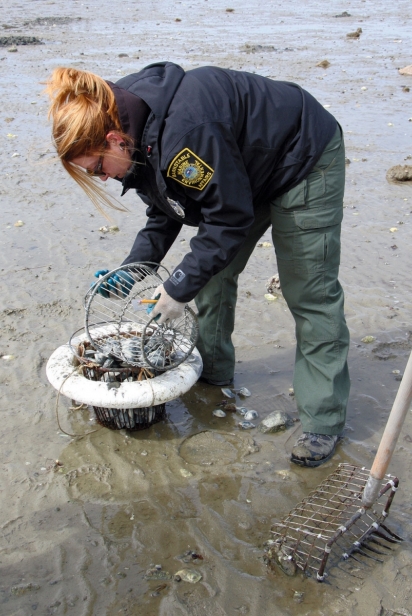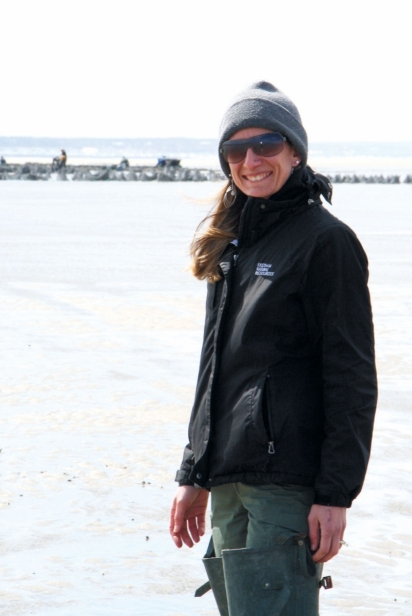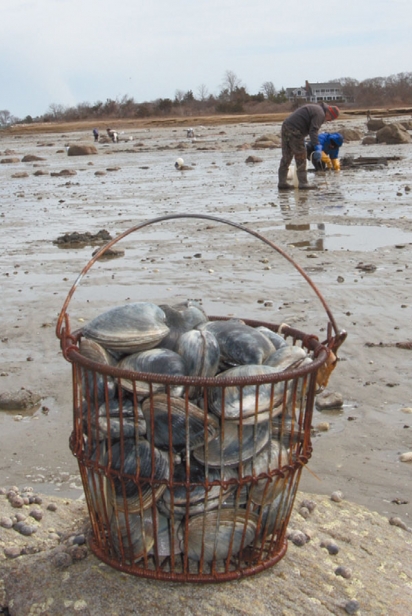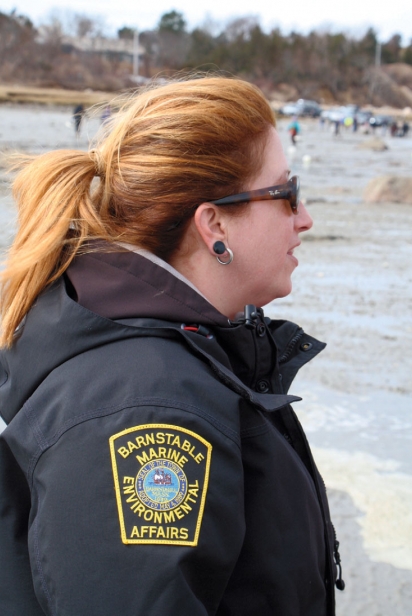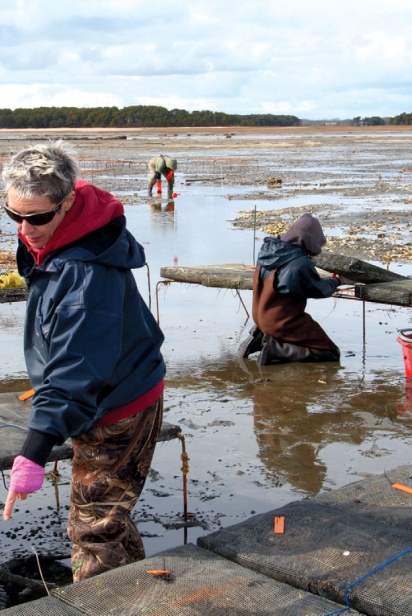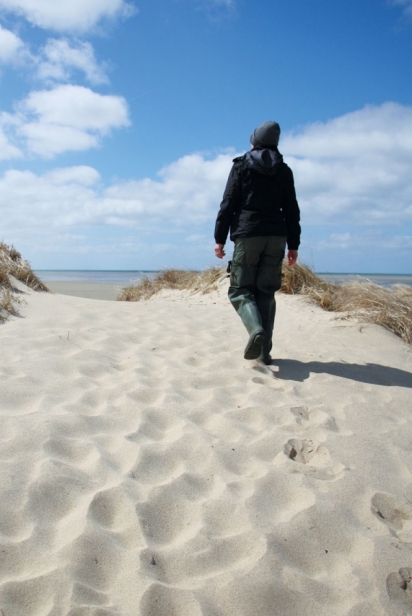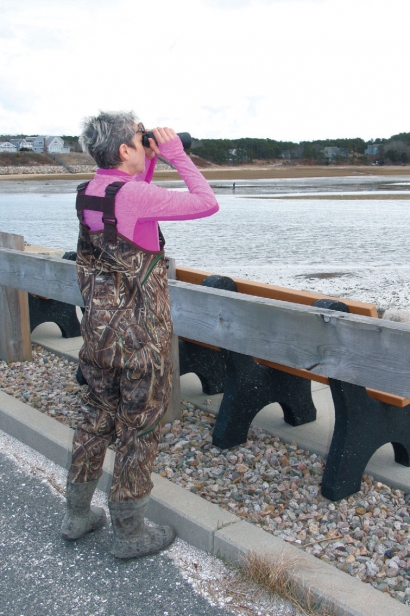Cape Cod's Female Shellfish Constables
Looking out over the perfectly still waters of Blackfish Creek in Wellfleet on a crisp March afternoon, it’s hard to believe that a vicious Nor’easter—the third in less than two weeks—will be here before morning. I am on a “tide ride,” or patrol, with the town’s shellfish constable, Nancy Civetta. This is our third stop, and there aren’t too many people out fishing today. In some places, Civetta can just pick up her binoculars and look out from the truck to see who is working on the flats; but she knows in advance that at this spot she will have to walk out for a short educational briefing with the lone figure stooped over in the sand.
At her job since August 10, Civetta is one of the Cape’s four female shellfish constables. The others are Amy Croteau, in Barnstable; Renee Gagne, in Chatham; and Nicole Paine, in Eastham. Each of the women has lifelong ties to the Cape. Two of them, Croteau and Paine, have lived here their whole lives. They bring a range of experience and expertise to the role that, in its essence, is responsible for protecting and managing the shellfishery as well as public health, by enforcing state and local regulations. All but Gagne are the first women in their towns to serve as constable.
“Though there are still some people who view this as a man’s position, I think there are a lot of strong females in the position now, and that is causing a shift in the way people think,” says Croteau. Vibrant and outgoing, with streaked hair, perfectly applied eye makeup and double-pierced ears offsetting her Barnstable Marine Environmental Affairs parka, Croteau greets me at her office on a brisk day in February. Her phone buzzes nonstop while we talk. A natural resources officer in Barnstable for nine years, and shellfish department employee for three years before that, she was appointed shellfish constable in 2017, when her predecessor was too ill to continue in the job (he passed away at the end of the year). She currently serves in two roles, saying, she is first and foremost a natural resources officer. Nevertheless, in 2017 the Massachusetts Shellfish Officers Association named her Massachusetts Shellfish Constable of the Year.
Croteau explains that while in some Cape Cod towns the shellfish constable is also responsible for municipal propagation, Barnstable has a full-time shellfish biologist and shellfish technician responsible for producing future generations. She oversees enforcement of all local, state and federal shellfish regulations, “to ensure public safety when consuming an animal that’s removed for eating from the ocean.” Key to this is controlling permits for recreational and commercial shellfishermen, visitors and aquaculturists. “With this job we also do a lot of educational outreach,” Croteau says. “We work really hard in programs that get kids invested in playing outside, being in nature, harvesting from the land.”
Shellfish contribute a lot to the Barnstable economy, in dollars and year-round jobs. There are roughly 30 aquaculturists in town, growing oysters and quahogs on 165 acres of designated farm area. They also catch softshell clams. Commercial wild shellfishermen (there are 47 in town) can catch “anything that’s open,” Croteau says, but most focus on razor clams, for which they can earn up to seven dollars per pound.
Laughing at the idea of a “typical day”, Croteau says, “You have to be very fluid. You have to be able to adapt to whatever it is that nature and the general public may throw your way. My day revolves around what time low tide falls,” she explains. Shellfishing hours are from one-half hour before sunrise to one-half hour after sunset. To enforce regulations, Croteau and her staff patrol 100 miles of shoreline. In season, when there is maximum daylight, they can be out on patrol for as long as six hours, starting as early as 5 a.m. “Our best hope is in the busy season we’re encountering 80% of the people that are physically out there,” she says. In her department, employees work weekends. That is not true for all towns. After Memorial Day weekend, the population swells dramatically and increasingly, people stay through Thanksgiving rather than Labor Day.
Looking ahead, Croteau says, “I’m lucky that I’m not the only person who thinks about where the shellfishery will go. We have a large staff of intelligent people who are extremely invested in their job, invested in the environment…We’re trying to grow our propagation program to meet the demands of a growing recreational fishery, of a sustainable commercial fishery and also of just a natural population…to keep the population stable.”
And she revels in the fact that every day, for her, is different. “I learn something new every day I show up to work.”
Renee Gagne came to her position as a former commercial fisher. A New Hampshire native, Gagne spent childhood summers in Eastham, where an aunt has a home. After graduating from college she returned to the Cape, “for my last hurrah, and I never left.” She moved to Chatham in 1983 and started working on longline boats, shellfishing between trips. Starting in around 1991, she focused exclusively on shellfish.
Sitting back comfortably in her office chair, Gagne says that a combination of factors, including her age—the Chatham shellfish professional turned 57 in March, though she looks at least a decade younger—led her to switch courses six years ago. That’s when Stuart Moore, who had been constable for 22 years, retired. At the time Gagne was chairperson of the town’s Shellfish Advisory Committee. “I thought it was written in the stars,” she says. “Because I was involved in the industry, [being a woman] was not an issue. I think it would have been harder for anybody who didn’t know the folks—I’m talking about commercial—to have stepped into Stuart’s boots. I think that would have been more difficult than gender.”
According to Gagne (2015 Massachusetts Shellfish Constable of the Year), Chatham has a huge wild shellfishery boasting softshell and razor clams, quahogs and mussels, but no real aquaculture. In 2017 the commercial wild shellfishery brought in a little over $5 million. That year the town sold 320 commercial and 2600 recreational shellfish permits, the latter available to residents and non-residents. The town’s 66 miles of coastline are open for shellfishing year-round.
There is a prohibition on aquaculture grants, which, Gagne explains, would be seen as potentially impinging on the wild stocks. The wild shellfishery is supported by a 50-year-old municipal propagation plan. “Our theory is that it creates a sustainable shellfishery,” she says. “We’re putting millions [of animals] in every year. Before they’re ready to harvest, they spawn, so we’re adding to the natural set.”
The shellfish department grows 2.5-3 million quahogs, 200,000 oysters and 250,000 bay scallops every year in a land-based upweller (tank). One of Gagne’s chief goals is to upgrade the facility and make it more inclusive. “It’s such a cool program. We think it’s a great learning tool about the environment and about shellfishing and about sustainable fisheries. We want to use it to transmit information to people who may not know much about shellfishing,” she says. During the summer, deputy constable Rachel Hutchinson, who is a propagation specialist, works exclusively on that, assisted by a couple of seasonal technicians.
Throughout the year, Gagne and her staff patrol every day. “This time of year I know where people are going,” she says in mid-February. In the summer, when there are long days and double tides, and the town’s population swells from 6000 to 30,000, “It’s crazy,” Gagne admits. Calling herself “half Mother Superior, half Dr. Phil,” she says, “If everybody’s not in by the time I go home, I worry about people. I have them call me when they get in [from patrol].”
The former commercial fisherman still maintains a recreational license. “I can’t tell you how much I love digging clams. It was a very Zen process for me,” she says. “I just love being out there. Even doing patrols. It’s all good. It never gets old for me.”
Like Amy Croteau, Eastham shellfish constable Nicole Paine is also a natural resource officer. A lifelong Wellfleet resident who received an associate degree from Cape Cod Community College in environmental studies in 2016, Paine has worked in the Eastham Department of Natural Resources since August of that year and was named shellfish constable in July 2017. Before joining the department, she ran a housecleaning business in Wellfleet.
“I didn’t know what I was going to do when I went to school,” says the 36- year-old single mother of two daughters. “I just knew that I loved the environmental field itself.” Paine’s sister told her about an opening in Eastham and convinced her to apply. “Coming here took me in the direction of becoming the constable,” she says.
For many years in Eastham, one person served as both harbormaster and shellfish constable. When the town separated the roles, Paine applied to be constable—the town’s first female in the role. “I wanted to be able to make positive changes toward the growth we have in the town,” she says. “I felt I’d be better able to help with those changes if I took on the position of constable.”
Her gender has not been an issue that she’s seen or felt, Paine says. Her predecessor, Michael O’Connor, is still in the department. “He has a lot of knowledge, background and history, which is very helpful,” she says.
Paine grew up in the Wellfleet fishing community. Her father was a commercial fisherman and the family branched out into aquaculture. Her sister, who lives in Wellfleet, has worked in the family businesses. Though the towns are next-door neighbors, Eastham does not share Wellfleet’s natural abundance of oysters. Nevertheless, the shellfish constable says, “We’re trying to boost our propagation. I would love to see oysters at one of our bay beaches.” The beaches’ exposure to the elements is one serious challenge.
Eastham issues around 150 commercial shellfishing permits per year, limited to Eastham and Orleans residents. Professionals catch clams, bay scallops and razor clams. Some focus on aquaculture, growing on 26.6 acres of active grants in the Town Cove and Nauset Marsh.
The department sells more than ten times as many recreational permits, which are not restricted to residents. People request softshell clams a lot for recreational purposes, Paine says. “Right now I can direct them to a lot of clams. I’d love to try to bring back softshell clams and oysters. We’re trying to come up with plans to plant softshell clams in the near future and see how they do…We have the elements of nature against us.” Another challenge, she says, is balancing the concerns of recreational fishermen with others who are trying to make a living off it.
Unlike many other shellfish departments, Eastham does not work around the tides. The four people in the department work a five-day week and have a set schedule. In the winter, patrolling the waters on the bay side, Town Cove and Nauset Marsh can all be done in an hour to an hour-and-a-half; in summer the bay side alone can take two hours.
With two teenagers, Paine says, “I try to leave the job here when I go home.” But in March she started taking an evening class, “Fundamentals of Shellfish Farming,” offered by Cape Cod Cooperative Extension, Southeastern MA Aquaculture Center and Woods Hole Sea Grant. She also meets with other constables to share ideas as often as she can. “I’m always learning, which to me is awesome.”
The most recent inductee to the class of female constables, Nancy Civetta, started her job in August 2017. Describing herself as a wash-ashore, Civetta says her family never lived in the same house for more than two years when she was growing up. “But I always, always came to Wellfleet since the year I was born.” So she always considered it home.
Ten years ago Civetta moved to Wellfleet permanently. She gave up her Cambridge-based public relations agency (full disclosure: I first met Civetta through that business, which focused on the culinary industry and specialized in sustainable seafood) and took a job with Pew Charitable Trusts on the Cape. Three years later she became communications officer for the Cape Cod Commercial Fishermen’s Alliance. She also married the Wellfleet builder she had been dating.
Shellfish are big business in Wellfleet. In 2017 the town was first in the state for wild oyster and farmed quahog landings; third for farmed oysters and fourth for wild quahogs. This represented $6.3 million for local shellfishermen. “Right now we are enjoying prolific oyster fishing,” Civetta says. “Wellfleet is unique in the natural productivity of the harbor.”
The idea of becoming Wellfleet’s shellfish constable appealed to Civetta because, she says, “I consider myself kind of a take-charge person. I ran my own company for ten years. I was looking to be a leader somewhere. I love working with fishermen. It’s what gives me the greatest satisfaction in my job.”
And she brings some special skills. “I know a lot about communication, so I’ve added a lot of value there. I know a lot about sustainable seafood and sustainable fisheries from my prior experiences, so I think I bring value that keeps it a top priority to make sure we have oysters and clams for tomorrow.” Civetta has also brought the shellfish department into the 21st century, transferring permit applications from a paper- to computer-based system, and message sending from snail mail to email and text.
But Civetta, 54, is the first to concede how much she still does not know. “Shellfishing has been 100% of an education,” she says. “There’s so much to learn and I’ve had two incredible teachers in assistant constable John Mankevetch and deputy constable Chris Manulla.” She adds that enforcement, shellfish biology and all the regulations are new to her. But she says, “I’m soaking everything up like a sponge. I love it because who would think that in the middle of life you get to become a student again? And it’s so invigorating and so motivating.”
So far, Civetta says Mother Nature is providing the biggest surprises in her new job. Four inches of rain in 24 hours forced a four-day shellfishing closure one week into her tenure. Early, unprecedented ice in the harbor in December blocked grant holders from removing their oysters and equipment, and caused damage to the beds—the full extent of which is still not known. And storms in March forced closures and may have damaged more equipment. On the flip side, “The openness with which I’ve been received and a real spirit of collaboration that I’ve felt from the fishing public has been a wonderful surprise.”
Friendly and approachable to everyone she encounters, Civetta loves her job and takes it very seriously. “Wellfleet has a world-renowned name for shellfish and I have been entrusted with overseeing that,” she says. “I am not going to mess around.”
As this issue goes to press, shellfish departments are shifting into high gear, preparing for their busiest time of year. Charged with protecting and preserving one of our region’s most valuable and delicious natural resources, the Cape’s female shellfish constables are putting their own stamps on a historic role. And adding a unique brand of diversity to the marine ecosystem.



